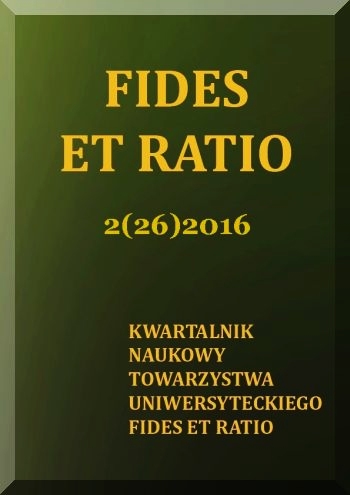Abstract
Forgiveness is psychologically difficult, because it means overcoming the strong, negative feelings. Although it is considered to be necessary to remove any blockages in the personal development. Some psychologists (Mellibruda) describe the lack of forgiveness as a kind of the lock in our development ("a trap of the unforgiven harm"). Forgiveness is the psychological paradox, but becomes understandable and natural if we apprehend it on the background of the personal relationships. These relationships are a response to the signs of act of existence of the Other real being (lat. transcendentalia) and always lead to the affirmation of any person. Because of the complexity of our human cognition, personal relationships first appear at the unconscious level of our mind (the so-called “speech of the heart – verbum cordis” level, the primary change of the passive intellect). Nevertheless they continuously guide towards the renewal of ties, even if we have suffered the harm. This theory gives the existential basis for the process of forgiveness. The effects of forgiveness are very positive and this is reflected in the culture and in the history.
References
Andrzejuk A., Prawda o dobru, Warszawa 2000:Wyd. UKSW.
Andrzejuk A., Uczucia i sprawności, Warszawa 2006: Wyd. Navo.
Andrzejuk A., Metafizyka obecności. Wstęp do teorii relacji osobowych, Warszawa 2012: Wyd. UKSW.
Fajkowska M., Krejtz I., Właściwości indywidualne i efekt twarzy w tłumie, Przegląd Psychologiczny, 2007, t.50, nr 4, 401-431.
Gilson E., Byt i istota, tł. Dorota Eska i Jerzy Nowak, Warszawa 2006: Wyd. PAX, wyd. II.
Gogacz M., Elementarz metafizyki, Warszawa 2008: Wyd. Navo. Wyd. IV.
Koneczny F., Święci w dziejach narodu polskiego, Warszawa/Kraków 1985: Wyd. Michalineum.
Mellibruda J., Pułapka nie wybaczonej krzywdy., Warszawa 1999 : Instytut Psychologii Zdrowia.
Nęcka E., Orzechowski J., Szymura B., Psychologia poznawcza, Warszawa 2013: Wyd. PWN.
Stróżewski W., Ontologia, Kraków 2003: Wyd. Aureus /Wyd. Znak.
Sucheni–Grabowska A. (red.), Dzieło Jadwigi i Jagiełły. Antologia, Warszawa 1985: Wyd. Archidiecezji Warszawskiej.
Szyndler L., Zagadnienie verbum cordis w ujęciu św. Tomasza z Akwinu, [w:] Wokół średniowiecznej filozofii języka, Studia nad filozofią starożytną i średniowieczną (red. Górniak A.), Warszawa 2002: Wyd. UW, s. 21-113.
